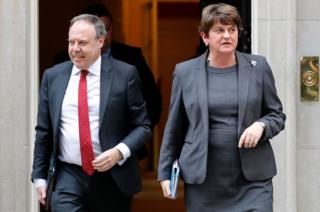Brexit: DUP 'cannot support' revised plan for NI
 Image copyright
AFP
Image copyright
AFP
The Democratic Unionist Party (DUP) has said it "could not support" Prime Minister Boris Johnson's revised Brexit plan for Northern Ireland.
Party leader Arlene Foster and deputy leader Nigel Dodds said on Thursday they were in talks with the government.
The support of the DUP is seen as crucial if the prime minister is to win Parliament's approval for the deal in time for his 31 October deadline.
The party said it would work with the government to "get a sensible deal".
"As things stand we could not support what is being suggested on customs and consent issues and there is a lack of clarity on VAT," it added.
The BBC's Europe editor Katya Adler said the EU's response to the DUP's refusal to back the plan was that it was a problem for the UK.
She said it was "embarrassing" for Mr Johnson and "uncomfortable for the UK".
European Parliament Vice President Mairead McGuinness, an MEP with the Republic of Ireland's governing party Fine Gael, said it was a "bad start to the day".
"Whatever optimism we had last night has been dampened a little by the [DUP] this morning," she added.
"It would be quite concerning if one political party can delay everything or have a veto over everything."
The prime minister will travel to Brussels later for a crunch EU summit as efforts continue to win support for his proposed Brexit deal from MPs at home.
No 10 said there were no plans for the prime minister to meet the DUP on Thursday.
BBC News NI's political correspondent Enda McClafferty said Mr Johnson was taking "a gamble" with the DUP.
He added that the prime minister put in a "huge effort" to try to secure the support of Brexit-supporting Conservative MPs.
"The feeling is that if Boris Johnson can nail them down and ensure that none of the group will align themselves with the DUP he feels that this may have a chance when it comes back to Westminster."
'Disaster for Northern Ireland'
Sinn Féin's vice-president Michelle O'Neill tweeted that a veto on the Northern Ireland plans must not be included as part of a Brexit deal.
Ulster Unionist MLA Steve Aiken said Mr Johnson's proposed deal keeps Northern Ireland in the EU "to all intents and purposes".
He told the BBC's The Nolan Show: "If you were a leave voter in Northern Ireland you'd be asking yourself: 'Is this what I voted for?'
"This has been a disaster for Northern Ireland - the only way we can get out of it is to stay [in the EU]."
Mr Aiken is the only contender for the soon-to-be-vacant leadership of the Ulster Unionist Party (UUP).
Alliance Party leader and MEP Naomi Long said she expected "more twists and turns" before the outcome of the Brexit talks would be known.
"I think it's a soft no [from the DUP]... so I don't think we can say the deal is completely dead in the water," she added.
Analysis: Regroup or press on?
BBC News NI political editor Mark Devenport
Boris Johnson could soon find out what it feels like to be Theresa May.
She had various deals done and then the carpet was pulled from under her feet by the DUP.
The interesting thing is whether Boris Johnson draws back from this deal and regroups with the DUP.
Or will he press on in the knowledge that after an election he might have an overall majority without them?
What does the proposed deal involve?
A Brexit deal under consideration in Brussels would involve Stormont giving ongoing consent to any special arrangements for Northern Ireland.
The Stormont role would not be the unionists' veto demanded by the DUP - instead the arrangements could be approved by a straight majority.
Pro-EU parties have a narrow majority at Stormont.
The proposed Brexit deal would involve Northern Ireland being treated differently to the rest of the UK.
It would continue to follow EU rules on food safety and product standards.
The DUP has already accepted that Northern Ireland would have to align with some EU rules to avoid a hard border.
Northern Ireland would also leave the EU customs union.
But EU customs procedures would still apply on goods coming into Northern Ireland from Great Britain in order to avoid checks at the border.
Stormont would have to approve those arrangements on an ongoing basis.
Approval would involve a straightforward majority, which would keep the special arrangements in place for four years.
Alternatively, if the arrangements are approved by a majority of nationalists and a majority unionists they would remain in place for eight years.
That would incentivise a cross-community consensus but it is not clear if that will be enough for the DUP to back the deal.
If the Northern Ireland Assembly voted to end the arrangements there would be a two-year notice period, during which the UK and the EU would have to agree ways to protect the peace process and avoid a hard border.
There is no fall-back position in case the two sides cannot find a solution.
If a vote was not held - by choice or because the assembly was not sitting - then there would be no change and the special arrangements would continue.
The EU believes that replaces the backstop - which would have lasted "unless and until" an alternative was found - with arrangements that are sustainable over time and are democratically supported, as requested by the UK.